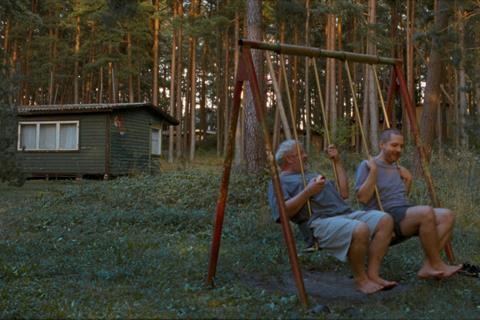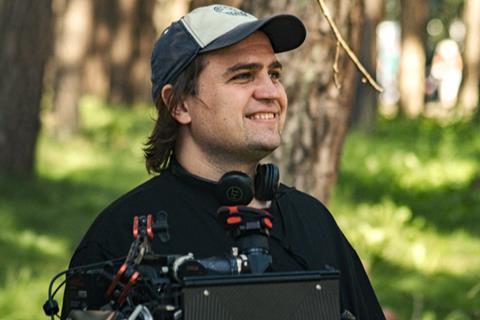
The Visitor is the anticipated feature debut from Lithuanian director Vytautas Katkus, also known for his work as a cinematographer. His first short film Community Gardens premiered at Cannes Critics Week, his second short film Places (2020) premiered in Venice while his third short film Cherries (2022) was part of the official selection of Cannes Court Metrage. Katkus was also the DoP on Locarno 2024 golden Leopard winner Toxic.
Co-written with Marija Kavtaradze (who won best director at Sundance for her film Slow), the film tells the story of 30-year-old Danielius, played by Darius Šilėnas. Living abroad with a wife and child, he returns to his Lithuanian hometown to sell his parents’ flat. But the visit lasts longer than he thought as tries to reconnect with people and his past in a city that no longer feels like it belongs to him.
The film is produced by Lithuania’s M-Films, the company behind Slow and 2021 Karlovy Vary premiere The Runner. It’s co-produced by Norway’s Stær Films and Sweden’s Garagefilm International. International Sales are handled by French outfit Totem Films. It world premieres in Karlovy Vary’s Crystal Globe competition on Monday (July 7).
How did The Visitor come about?

Marija Kavtaradze has been a very close friend of mine for many years. We’ve always shared our ideas with each other at different stages: sometimes we ask for advice, and other times we simply talk things through.
At the time, I had an idea, or rather, a few ideas and themes centred around different episodes of loneliness. I was trying to piece them together into a single story, a single film. When I first attempted to explain to Marija what I was working on, she offered to help and suggested we write it together. At first, it felt more like a game: writing separate stories and arranging them not by narrative or chronology, but by mood.
That was just the starting point. As we continued writing, talking, and discussing, we realised it would be better to focus on a single story and explore how to expand it.
The Visitor could be classed under the genre of ‘slow cinema’ but there are also hints of the surreal and magical realism. What appeals to you about undercutting the realism with more ‘fantastical’ moments?
It’s the moment when you start to fully understand the world or environment around you, and you’re no longer just doing things in it, but really inhabiting it. And when that happens, the strangest things can occur - things that are entirely real, but when viewed in isolation, they feel surreal or magical.
I think you can apply this to almost anything. For example, if you leave fruit in your kitchen for too long, it starts to rot, to decay, mould begins to grow. It’s a very natural process but if you just look at that moment in itself, it can seem oddly magical.
Magical moments are everywhere. You just have to wait for them and notice them. It’s a bit like daydreaming, or a kind of joy, or even a reward that comes after sitting through boredom. That’s the feeling I wanted to show in the film. To me, it’s deeply real.
Can you expand on casting Darius Šilėnas as Danielus – he’s expected to carry a large part of the movie.
Darius is a longtime friend and colleague. We studied around the same time, he in directing, I in cinematography. In fact, some of the first projects I shot at the academy were with him. Nowadays he works as an editor, but I remember how, back then, directing students often acted in each other’s films and Darius did too. So you could say he has a foundation, or at least a bit of experience in acting, and that definitely helped during The Visitor. We were able to capture his authenticity on screen, and he knew how to manage and present that authenticity in front of the camera.
What projects do you have in the pipeline?
I’m slowly starting to jot down ideas and themes for a new script, but at the moment, my main focus is on a few projects where I worked as a cinematographer that are now in postproduction. All my attention is going toward finishing them, colour grading and the final touches.
One of them is Aistė Žegulytė’s documentary Holy Destructors. Without giving too much away about the story, I’ll just say that working with Aistė on documentaries has taught me a lot about observing the world and patiently waiting for situations to unfold. That kind of attentiveness or what I’d call a that trained way of seeing reality I’ve learned from documentary is something I try to carry over into fiction filmmaking as well.

























No comments yet